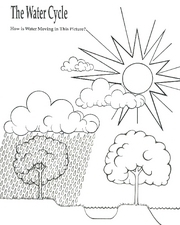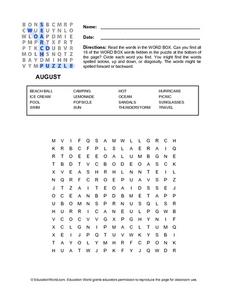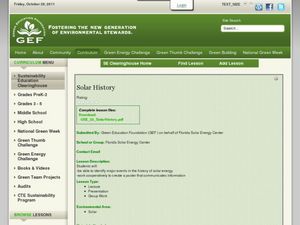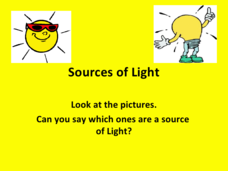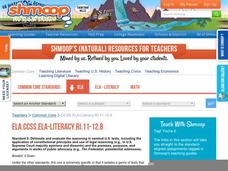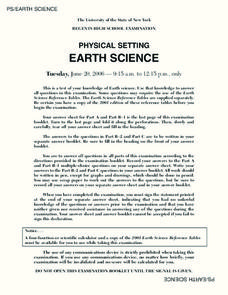Scholastic
Study Jams! A Day on Earth
It's good thing that it isn't up to RJ to spin the earth on its axis; he can't even keep a basketball spinning! In this video animation, he and viewers learn about Earth's movements in space. One thing to consider before you use this...
Curated OER
Reason for the Seasons
Young scientists examine why we have seasons on Earth, and how the motion of the Earth around the Sun causes them. Groups of learners are given a variety of balls, a bamboo stick, a marker, and a flashlight, then use the objects to...
Curated OER
Seasons Worksheet
Middle and high schoolers are given a diagram of the Earth rotating around the Sun. They label the seasons in the proper place, highlight special days such as the vernal equinox and autumnal equinox, the dates the special days fall on,...
State of New Jersey
The Water Cycle - How is Water Moving in This Picture?
Here is a picture of a landscape, complete with the sun, clouds, and some rain. Use it by projecting onto your whiteboard and drawing arrows and labeling three main steps in the water cycle as you teach, or hand it out to little ones as...
Curated OER
Blast Off Into Space
Learners explore the vastness of the universe and identify terms used to describe solar systems. They take a tour of our sun and its neighbors and discover how spacecrafts can fly and then use their imaginations to draw and color a...
Curated OER
My Shadow Pictures
Students capture shadows for a shadow dance! They experiment with shadows created by people or items blocking light sources (sun, bright lamp) to draw their shadow pictures. Afterward, they cut out the shadows and arrange them on a large...
Produce for Better Health Foundation
From Grapes to Raisins
How do you make raisins? Do a simple experiment with your class that prompts them to set a bunch of grapes in the sun for a few days, and see what they find!
Curated OER
August Word Search
In this August word search activity, students locate 16 summer themed words that are hidden in the puzzle. They locate words such as swim, sun, and picnic.
Curated OER
Space Words and Comparatives
Which is bigger: the sun or the moon? Which is nearer: the planets or a star? English Language Learners first located a series of space-related nouns and adjectives in a word search, and then identify the comparative and superlative...
Curated OER
Color Word Matching
In this color worksheet, students draw a line to match the clip art pictures with the color words that correspond with them. They match 12 items which include a sun, a blue balloon, a red bow tie, and a green lizard to the color words...
Curated OER
Find the Shapes in a Picture
Use coloring to remind young learners that geometry is all around them! A simple image of a house, sun, and tree becomes the format for several basic shapes. The instructions direct scholars to trace and color each shape using a...
Curated OER
Solar History
Using the sun's light as a source of energy is not a new concept. Give your environmental studies, engineering, or physical science class this list of how humans have used solar energy throughout history. Assign groups a certain time...
Curated OER
Albedo and Irradiation of Surfaces
Here is a physical science activity where pupils place thermometers inside of a white and a black paper pocket and place them under a lamp. They record and compare the temperature increase over a ten-minute period. Have your class...
Curated OER
Food Chains
This simple collection of slides depicts four different food chains, including one for a freshwater habitat. Ideal for primary science learners, the slides employ a combination of photographs and graphics of the sun, plants, and animals....
Curated OER
CVC Words
Practice simple sight words. Focusing on words such as bat, run, and sun, learners explore reading and spelling skills. It is a quick and easy way to review this topic. A teacher could add words to the presentation to make it a richer...
Curated OER
Homophones
Help your class understand homophones using this presentation. Learners discuss the difference between common homophones, such as son and sun, road and rode, and sea and see. This would be a great way to kick off a lesson on homophones.
Curated OER
Sources of Light
In pairs, learners will consider and discuss each of the provided slides to determine which objects are a source of light. Items include, but are not limited to, lamps, windows, pencils, mirrors, and the sun; these items are great for...
Curated OER
Motions and Their Effects
With a simple blackboard-style appearance, these slides list facts about the reason for the seasons, solstices, and equinoxes. It also touches on Kepler's first law of planetary motion. There are no pictures or graphics to help explain...
Illustrative Mathematics
How is the Weather?
This activity asks learners to interpret data displayed on a graph within the context of the problem. Students are given three graphs that show solar radiation, or intensity of the sun, as a function of time. They are also given three...
Shmoop
ELA.CCSS.ELA-Literacy.RI.11-12.8
It is no easy feat to wade through legal and political documents. And incorporating this type of informational text into a literature class can also be a challenge. Here’s a resource that includes suggestions for how to address this...
9/11 Memorial & Museum
Exploring Afghani Culture through Literature
Hosseini Khaled's The Kite Runner and A Thousand Splendid Suns are the anchor texts in a semester-long course that explores Afghani culture and traditions.
Curated OER
Solar Kit Lesson #15 - Solar-Powered Electrolysis of Water and the Hydrogen Economy
An outstanding lesson awaits your physics fledglings! After reading about how hydrogen can act as an energy carrier, they examine the electrolysis of water using solar power. They test the gases produced for flammability and will...
New York State Education Department
Regents High School Examination: Earth Science - June 2006
In this earth science worksheet, students answer fifty multiple choice questions and thirty-three short answer questions in preparation for the earth science final exam.
NASA
Producers Make Their Own Food
During an inquiry-based lesson, scholars decide which variable to test and then design an experiment to determine the needs of producers. After two weeks, they complete a full analysis and research paper.





